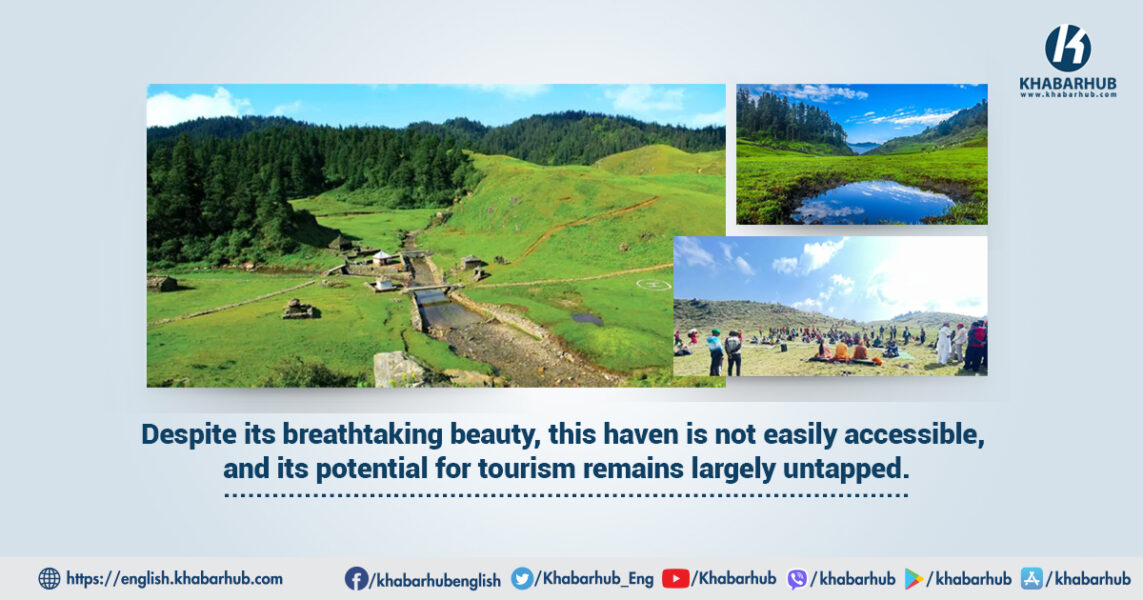0%

Khaptad National Park/File Photo
KHAPTAD: Nestled at the head of Achham, Khaptad stands as the meeting point of Bajura, Doti, Bajhang, and Achham.
Recognized as the ‘Earthly Paradise,’ Khaptad sits majestically at an altitude of 3200 meters, spanning across 225 square kilometers.
Despite its breathtaking beauty, this haven is not easily accessible, and its potential for tourism remains largely untapped.
One of Khaptad’s most enchanting features is the vibrant display of flowers across its 22 sprawling branches, where trees appear to be meticulously planted together.
With a rich biodiversity boasting 260 bird species and over 500 herbs, Khaptad was designated a national park in 1984 by the government, aiming to safeguard its remote beauty for generations to come.
However, the establishment of the national park has inadvertently restricted access to common people, as the Nepali Army, tasked with its protection, limits interactions with the area.
This governmental approach, while intended to preserve the ecosystem, has inadvertently hindered tourism, preventing the full realization of Khaptad’s potential as a tourist hotspot.
Despite its status as a natural treasure trove, Khaptad faces challenges in promoting tourism due to geographical constraints and government indifference.
Khaptad stands out as a prime destination for domestic tourists, yet a crucial challenge persists—tourists face difficulties finding places to eat in the Khaptad area.
The reluctance to actively promote this earthly paradise may hinder the region from becoming the thriving tourist destination it has the potential to be.
In order to oversee the management of the Khaptad region and lay the groundwork for tourism development, the government established the Khaptad Region Tourism Development Committee in 2063 BS.
A subsequent decision was made to bring the committee under the jurisdiction of the provincial government for the focused development of Khaptad.
However, the formation of the committee under the provincial government faced prolonged delays due to various reasons.
Finally, in 2077 BS, two years after the Sudurpaschim Province cabinet meeting approved the Khaptad Area Development and Management Committee order of 2075 BS, the committee was established.
Despite its formation, the committee’s efforts to boost tourism in Khaptad have fallen short of expectations, according to Bhim Khadka, Chairman of the Khaptad Area Development and Management Committee.
While Khaptad holds immense potential as an international spiritual destination, Khadka expresses dissatisfaction with the lack of government support.
Khaptad boasts several religious and mythological sites such as Khaptad Ashram, Triveni, Sahasralinga, Khaduli, Daduli, Myko Than, Khapar Mashta Mandu, Khapar Dah, Nagadhunga, and Damphekot.
Chairman Khadka emphasizes that the area, where Bramhalin 1008 Khaptad Swami Shree Sachinananda Saraswati undertook penance and sadhana, could be easily developed into a spiritual haven.
Presently, Khaptadaswamy’s hermitage has been transformed into a museum showcasing various artifacts, including rags, shoes, skins of deer, tiger, bear, musk, and musical instruments used as bedding.
Khadka asserts that Khaptad itself is a living museum of nature.
A few months ago, an international spiritual conference convened in Khaptad, attended by Prime Minister Pushpa Kamal Dahal, aimed at the development of Khaptad.
During the conference, Prime Minister Dahal inaugurated the event and pledged to establish the ‘Khaptad Development Foundation’ or ‘Khaptad Development Fund.’
Despite the discussions surrounding Khaptad, its publicity remains limited, and the need for global promotion persists.
Yoga Guru Ramdev, present at the conference, described Khaptad as a supernatural area and emphasized its significance in the spiritual realm.
Ramdev urged individuals to visit Khaptad at least once in their lifetime.
However, challenges, including policy issues and resource management, have hindered the realization of the promises made on this sacred land by Prime Minister Dahal, leaving the hands of the workers tied.
Lack of Infrastructure Hinders Khaptad’s Potential
Khaptad stands out as a prime destination for domestic tourists, yet a crucial challenge persists—tourists face difficulties finding places to eat in the Khaptad area.
Chairman Khadka emphasizes the need for a hotel equipped with facilities, stating that without such amenities, high-class tourists are deterred from visiting.
He laments the government’s failure to create an investment-friendly environment in this sector, attributing the hesitation of businessmen to invest in the area to the presence of the national park.
Khadka underscores the importance of government-level policy initiatives and encouragement for investment to address this issue.
Developing this scenic haven requires concerted efforts and investments at various government levels to unlock its full potential as a tourist destination.
He argues that proactive measures are necessary to overcome the reluctance of investors caused by the national park designation.
According to Khadka, focusing on the promotion of tourism in Khaptad and providing essential facilities such as food and accommodation will not only attract domestic tourists but also draw visitors from around the globe.
However, even the committee assigned to oversee other physical constructions in the Khaptad area faces challenges in meeting expectations.
Khadka points out that the reduced budget following the transition from the federal government to the state government poses a hindrance to effective physical construction work.
Highlighting the inadequacy of the allocated budget, Khadka anticipates challenges in the development of the Khaptad area, stressing the need for active involvement at all three government levels—local, state, and federal.
Despite the existing geographical obstacles and the lack of residential facilities, domestic and some international tourists are already making their way to Khaptad.
Khadka envisions a prosperous future for the region if hotels and well-maintained roads for comfortable travel are established.
He argues that transforming Khaptad into a center of international attention will not only benefit the entire province but will also have positive ripple effects for the entire country.
Developing this scenic haven requires concerted efforts and investments at various government levels to unlock its full potential as a tourist destination.